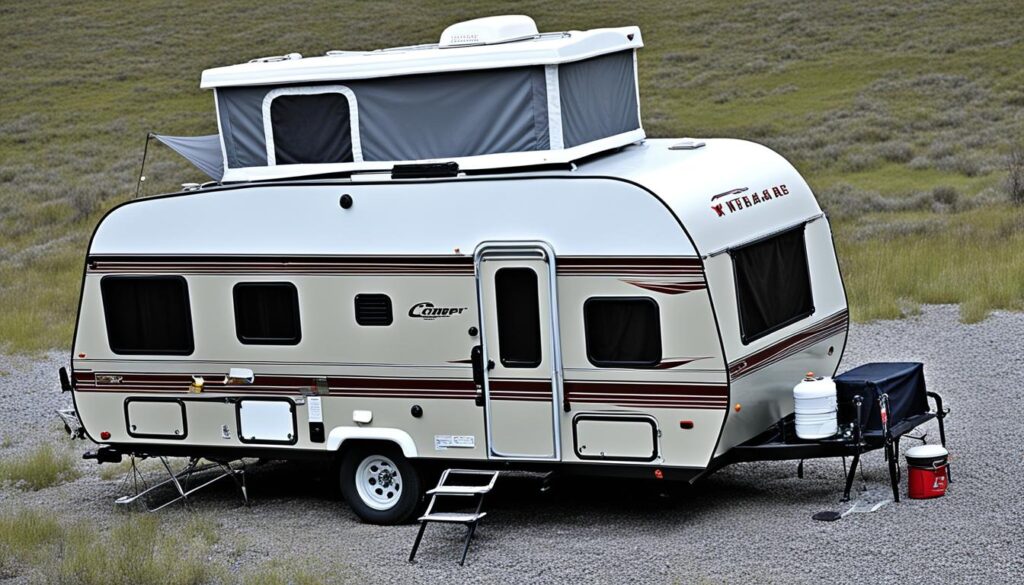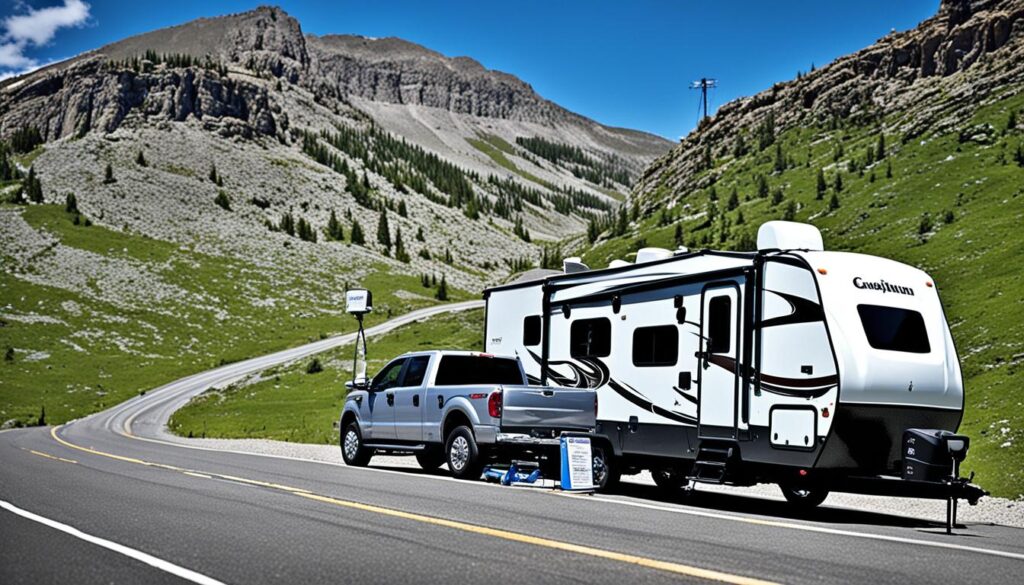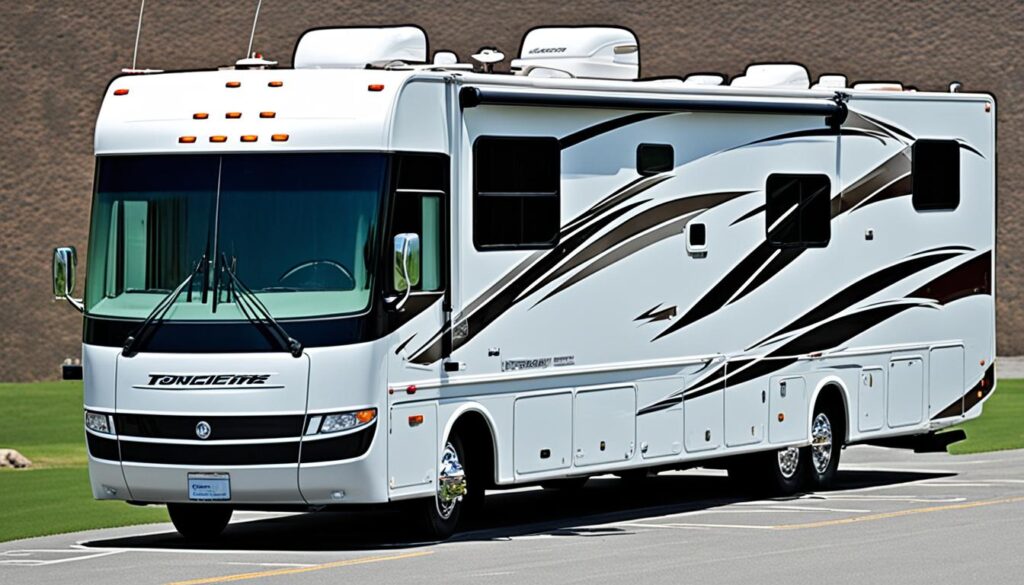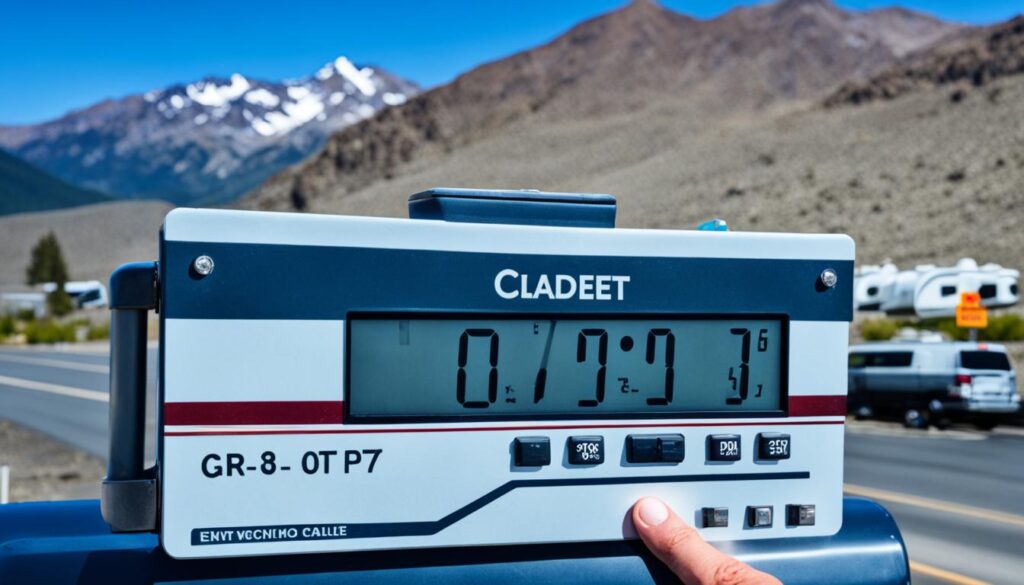When it comes to RVs, have you ever wondered how much they weigh on average? Are you curious about the weight limits and how it affects your travels? Understanding the weight of an RV is crucial for a safe and enjoyable journey. It can impact where you can go, the cost of travel, and even the overall towing experience. But just how heavy is an RV?
- The weight of an RV plays a significant role in determining where you can travel and the overall towing experience.
- Understanding different weight ratings like dry weight, GVWR, maximum trailer load, and tongue weight is essential for safe RV journeys.
- RV weights can vary significantly within each category, and it’s important to consider the factors that contribute to the weight.
- Choosing the right RV for your needs involves considering factors such as travel frequency, parking and camping needs, and hauling capabilities.
- Class A motorhomes can weigh up to 22,000 lbs, while small utility trailers weigh around 1,100 lbs on average.
Contents
Understanding Dry Weight
Dry weight is an important measurement when it comes to understanding the weight of an RV. It refers to the weight of the camper without any added cargo, fuel, or passengers. The dry weight is determined by factors such as the materials used in the construction, the manufacturing process, the internal features, and the size of the loading space.
Heavier camping vehicles typically offer more amenities and space for travelers. However, it’s important to note that the dry weight does not include any additional items you may bring along on your camping trips, such as camping gear, food, and personal belongings. These items will add weight to your RV and should be considered when planning your adventures.
To determine the exact dry weight of your trailer, you can unload all equipment and weigh the trailer separately from the tow vehicle. This can be done at a local weigh station or using portable scales designed for this purpose. By subtracting the weight of the tow vehicle from the total weight, you can calculate the dry weight of your camper.
Pro Tip: If you frequently travel with different amounts of cargo, it can be helpful to keep track of the dry weight of your RV along with the weight of specific items you typically bring along. This will allow you to calculate the total weight of your camper with different cargo configurations, helping you stay within weight limits and ensure safe towing.
Understanding the dry weight of your camper is essential not only for planning your trips but also for selecting the right tow vehicle. By knowing the dry weight, you can choose a tow vehicle with the appropriate towing capacity, ensuring a safe and comfortable towing experience. It’s always recommended to consult your vehicle’s manufacturer specifications to determine its towing capabilities.
Next, let’s explore another important weight measurement: the Gross Vehicle Weight Rating (GVWR).

Understanding GVWR
In the world of RVs, there are various weight ratings to consider, each providing important information about the vehicle’s capabilities. One crucial measurement to understand is the Gross Vehicle Weight Rating (GVWR). The GVWR represents the total weight an RV can safely handle, including the weight of the vehicle itself, passengers, cargo, and fluids such as fuel and water when they are at their maximum capacity.
When calculating the GVWR, manufacturers take into account optional features and the size of the cargo load. It is important to note that exceeding the GVWR can lead to negative consequences, such as damage to your gear and a decrease in driving speed, particularly when towing uphill.
If you are curious about the total weight of your trailer, you can perform a simple weighing process. Fill all the tanks, add your equipment and supplies, and take your RV to a truck scale. By doing so, you can determine whether or not your RV’s weight falls within the GVWR limit.
| RV Type | Average GVWR (lbs) |
|---|---|
| Small Utility Trailers | 1,100 |
| Pop-Up/Teardrop/Small Campers | 3,000 |
| Travel Trailers | 7,000 |
| Class B Motorhomes | 11,000 |
| Class C Motorhomes | 14,500 |
| Class A Motorhomes | 22,000 |
Table: Average GVWR for Different RV Types
As shown in the table above, the average GVWR can range from 1,100 lbs for small utility trailers to 22,000 lbs for Class A motorhomes. These numbers provide a general idea of the weight capacity of each type of RV.
It is important to remember that the GVWR is not just a number to be ignored. Exceeding this weight rating can have serious consequences, compromising the safety and performance of your RV. Always ensure that you are aware of and abide by your RV’s GVWR to have a safe and enjoyable journey.
Understanding Maximum Trailer Load
When it comes to towing an RV, it is crucial to be aware of the maximum trailer load that your vehicle can safely handle. The maximum trailer load refers to the total weight that your vehicle can carry under normal conditions, including the weight of the trailer itself. It is important to note that the maximum trailer load does not include the weight of the driver, passengers, or any additional cargo.
To determine the maximum trailer load for your vehicle, you need to consider the weight limit of your camper and its towing capacity. A general estimate is to add 1,500 pounds to the dry weight of the camping trailer. This will give you an idea of the maximum load that your vehicle can safely handle.
Exceeding the maximum trailer load can have significant consequences. Going beyond this limit can cause damage to your gear over time and can also affect the performance of your vehicle, particularly when driving uphill. It is important to prioritize safety and adhere to the weight limits specified by the manufacturer of your vehicle.
“Properly distributing the weight of the load and ensuring that it falls within the maximum trailer load will help maintain the stability and control of your vehicle during towing.”
To further illustrate the importance of adhering to the maximum trailer load, let’s take a look at the following table:
| Vehicle Model | Maximum Trailer Load (lbs) |
|---|---|
| Toyota Tacoma | 6,400 |
| Ford F-150 | 13,200 |
| Chevrolet Silverado 2500HD | 18,500 |
As seen in the table, different vehicles have varying maximum trailer load capacities. It’s essential to consult your vehicle’s specifications and adhere to the recommended maximum trailer load for safe and efficient towing.

By understanding the maximum trailer load and respecting the weight limits, you can ensure a smooth and safe towing experience, maintaining the integrity of your gear and maximizing the performance of your vehicle.
Understanding Tongue Weight
When it comes to towing a trailer, understanding tongue weight is crucial for safe and stable towing. Tongue weight refers to the amount of weight that pushes down on the attachment hitch of a trailer. It plays a significant role in weight distribution and ensuring proper towing performance.
Matching the tongue weight with your tow vehicle’s hitch rating is essential. The hitch rating indicates the maximum weight that your hitch can handle. If the tongue weight exceeds the hitch rating, it can lead to instability and increased risk of accidents.
Weight distribution is a critical factor in achieving safe towing. When properly distributed, the weight on the trailer is balanced between the hitch and the axles. This allows for improved stability and control while on the road.
It’s important to note that tongue weight shouldn’t be too light or too heavy. If the tongue weight is too light, the rear of the tow vehicle may be lifted, affecting steering control and traction. On the other hand, if the tongue weight is too heavy, it can overload the rear suspension of the tow vehicle, causing it to sag and impacting braking performance.
To ensure proper weight distribution and safe towing, it’s recommended to aim for a tongue weight that falls between 10-15% of the total trailer weight. For example, if your trailer weighs 5,000 lbs, the tongue weight should be around 500-750 lbs.
One way to measure tongue weight is by using a specialized scale, known as a tongue weight scale. This scale can provide an accurate reading of the tongue weight, allowing you to adjust and distribute the weight as needed.
When setting up your trailer for towing, make sure to distribute the weight evenly and secure any cargo properly inside the trailer. This will help maintain proper tongue weight and ensure a smooth and safe towing experience.

Overall, understanding and properly managing tongue weight is crucial for safe and stable towing. By matching the tongue weight with your hitch rating and distributing the weight effectively, you can enjoy a stress-free journey while towing your trailer.
Average RV Weights by Category
When it comes to RVs, their weights can vary significantly based on the category they belong to. Let’s take a closer look at the average weights of different types of RVs.
Small Utility Trailers
Average dry weight: 1,100 lbs
Small utility trailers are lightweight options that are perfect for carrying basic equipment and supplies. They offer convenience and easy towing, making them suitable for smaller vehicles.
Pop-Up/Teardrop/Small Campers
Average dry weight: 1,800 lbs
Pop-up campers, teardrop trailers, and small campers are compact and lightweight, making them great for weekend getaways. They provide basic amenities while keeping the weight manageable for towing.
Travel Trailers
Average dry weight: 6,000 lbs
Travel trailers come in various lengths and sizes, offering a range of features and amenities. They are popular among RV enthusiasts and provide a comfortable living space while still being relatively easy to tow.
Class A Motorhomes
Average weight: Up to 22,000 lbs
Class A motorhomes are the largest and most luxurious RVs. With their spacious interiors and extensive amenities, they provide a home-like experience on the road. Due to their size and added features, they are heavier than other RV categories.
Class B Motorhomes
Average weight: Around 9,000 lbs
Class B motorhomes, also known as camper vans, are compact and versatile. They offer the convenience of a motorhome while being easier to drive and maneuver. Their weight is relatively moderate compared to larger RVs.
Class C Motorhomes
Average weight: Approximately 16,000 lbs
Class C motorhomes are a popular choice for families and large groups. They offer ample living space and amenities while being more compact and affordable than Class A motorhomes. Their weight falls in between Class A and Class B motorhomes.
It’s important to note that these weights are averages and can vary depending on the specific make, model, size, and features of the RV. When considering an RV, it’s essential to assess its weight and ensure that your tow vehicle or motorhome is capable of safely handling the load.
Weight Variation by RV Length
When it comes to travel trailers, the weight can vary based on the length of the vehicle. Generally, longer travel trailers tend to be heavier, but there are other factors that can influence the weight, such as construction materials and design.
Let’s take a look at some examples of weight variation based on length:
| Travel Trailer Length | Weight Range |
|---|---|
| 16 feet | 2,200 to 3,400 lbs |
| 20 feet | 3,500 to 5,200 lbs |
| 25 feet | 4,800 to 6,800 lbs |
| 30 feet | 7,000 to 7,800 lbs |
Please note that these weight ranges are approximate and can vary depending on the specific model and brand of the travel trailer.
As you can see, there is a correlation between the length and weight of a travel trailer, but it’s important to research and check the specifications of each individual model to get an accurate understanding of its weight.
Next, we’ll discuss how to choose the right RV for your needs, taking into consideration factors such as motorized vs towable RVs, size, and weight considerations.
Choosing the Right RV for Your Needs
When it comes to choosing the perfect RV for your needs, there are several important considerations to keep in mind. First and foremost, you’ll need to determine whether you prefer a motorized RV or a towable RV. Motorized options such as Class A, Class B, and Class C motorhomes offer the convenience of having all amenities onboard, providing a luxurious and self-contained travel experience.
On the other hand, towable RVs like travel trailers and fifth wheels offer the flexibility of unhitching and using your vehicle separately. This can be beneficial if you plan on using your tow vehicle for other purposes when not camping. It’s essential to assess your specific needs, considering factors such as the frequency of use, parking and camping requirements, and hauling capabilities.
Another crucial aspect to consider is the size and weight of the RV. Ensure that your current vehicle has the towing capacity to safely handle the weight of your chosen RV. Taking into account the size of your family or travel companions, as well as the desired features and overall comfort, will help in making the right decision. Ultimately, finding the perfect RV involves careful consideration of your budget, individual needs, and preferences.
FAQ
How much does an RV weigh on average?
The average weights of various types of RVs range from small utility trailers weighing 1,100 lbs to Class A motorhomes weighing 22,000 lbs. It’s important to note that these are averages, and individual RV weights can vary significantly within each category.
What is dry weight in an RV?
Dry weight refers to the weight of an RV without any added cargo, fuel, or passengers. It is determined by factors such as the materials, manufacturing, internal features, and size of the loading space. To find the exact dry weight of your trailer, you can unload all equipment and weigh the trailer separately from the tow vehicle. Subtracting the tow vehicle weight from the total weight will give you the dry weight of your camper.
What is GVWR in an RV?
GVWR (Gross Vehicle Weight Rating) is the total weight of an RV when the tanks and cargo load inside the vehicle are completely full. It takes into account optional features and the size of the cargo load. Exceeding the GVWR can lead to damage to your gear and reduced driving speed, especially when towing uphill.
What is the maximum trailer load for an RV?
The maximum trailer load refers to the total weight that your vehicle can safely carry under normal circumstances. A general estimate for the maximum trailer load is to add 1,500 pounds to the dry weight of the camping trailer. Going beyond the maximum trailer load can cause damage to your gear over time and decrease the speed at which you can drive, particularly uphill.
What is tongue weight in an RV?
Tongue weight refers to the amount of weight that pushes down on the attachment hitch of a trailer. It is important to match the tongue weight with your tow vehicle’s hitch rating for proper weight distribution.
What are the average weights of RVs by category?
The average weights of RVs can vary widely depending on their category. Small utility trailers have an average dry weight of 1,100 lbs, while pop-up/teardrop/small campers weigh around 1,800 lbs. Travel trailers have an average dry weight of 6,000 lbs, and Class A motorhomes can weigh up to 22,000 lbs. Class B motorhomes weigh around 9,000 lbs, and Class C motorhomes weigh approximately 16,000 lbs.
How does weight vary based on the length of a travel trailer?
The weight of a travel trailer can vary based on its length. In general, longer travel trailers tend to be heavier, although the weight can also be influenced by factors such as construction materials and design. A 16-feet travel trailer typically weighs around 2,200 to 3,400 lbs, while a 30-feet travel trailer can weigh between 7,000 to 7,800 lbs.
How do I choose the right RV for my needs?
When deciding on the right RV for your needs, consider if you prefer a motorized RV or a towable RV. Also, ensure that your current vehicle can safely tow the weight of the RV you choose. Ultimately, finding the perfect RV involves considering your budget, the number of people traveling, desired features, and overall comfort.






